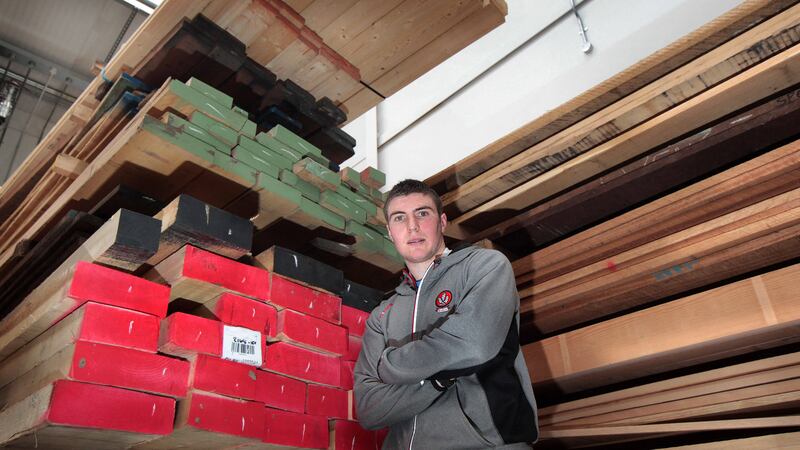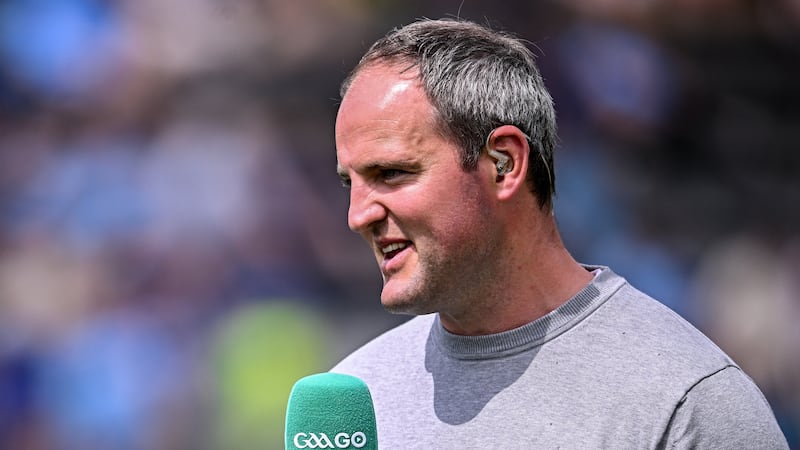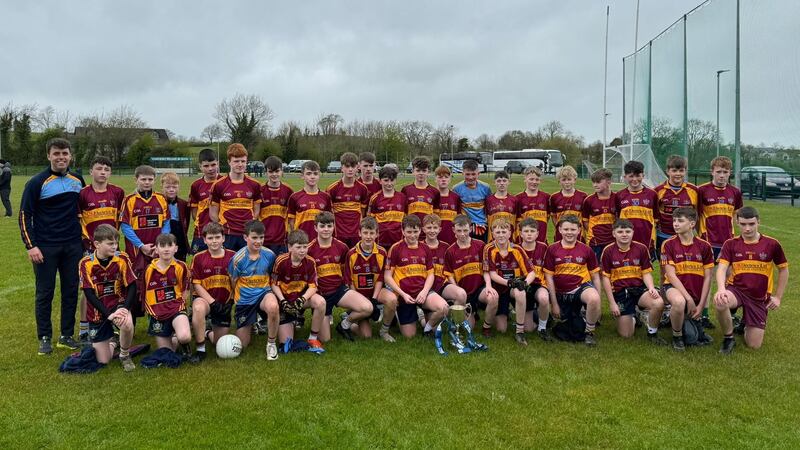CIARÁN McFAUL didn’t have to travel very far when he attended the Derry press event in Maghera.
Held at the headquarters of team sponsors Specialist Joinery Group, McFaul works for the company, which is based in his native town.
“I just had to get showered and changed,” smiled McFaul when asked about his journey from the factory floor to the plush executive offices.
While Specialist Joinery Group has its business sights fixed firmly on London, the heart of the company lies much closer to home. Founded by Ardboe native John Bosco O’Hagan, who has since settled in Bellaghy, the walls of his boardroom are a celebration of Tyrone and Derry football.
Among the memorabilia, there are framed Derry jerseys, huge photographs of the 2003 Tyrone team and an art piece celebrating Jim McKeever’s famous catch in the 1958 All-Ireland final.
This is a company rooted in an area where football matters. McFaul is a product of that environment. Managed by double Allstar winner Enda Gormley, McFaul was a key player on the Glen minor teams, which have dominated the Ulster club Championship at St Paul’s. Glen have won the tournament on four successive occasions. McFaul played in the first three triumphs, captaining the team to victory in 2012.
As a footballer, McFaul is the quintessential playmaker. He is a superb kick-passer. He has the uncanny knack of delivering the right pass at the perfect time. However, the nature of the modern game means Derry supporters have rarely seen McFaul performing the role that he does best.
Watch McFaul play for Derry and for the bulk of the game he is running up and down the field, chasing men, tracking back and blocking channels. It may not be his natural game, but McFaul accepts the role.
“It’s about buying into the system,” he said.
“It’s about work-rate more than anything, then your football comes after that. There isn’t a pile of kick passing. It’s more about hand passing and breaking the line. At club level, it’s different. There is still a lot of kick passing at club level. It’s more traditional. At county level, you just have to buy into the system and be a team player.”
Given his ability to pick a pass, it’s seem inevitable that a player like McFaul must get frustrated by the fact the game no longer affords him an opportunity to express himself. But the 21-year-old said he simply accept the reality of the situation.
“Teams just don’t let you do it,” he said.
“It wouldn’t make a lot of sense. You can’t really kick the ball into the full-forward when there are two or three men around him.”
If teams are reluctant to kick the ball, the only alternative is to run with it. McFaul confirmed that the modern game is all about running.
“You have to keep the ball. It is ugly to watch at times, and sometimes it is ugly to play, because you are going nowhere. You can also do a lot of running and never get the ball. It’s about work-rate up and down the pitch.
“For Derry, I have covered more ground in a game than I have ever covered, and there are times when I have only touched the ball five or six times.
“For Glen, when you are making the 100-metre runs, you are getting on to the end of the move. For Derry, when you are making the 100-metre runs, there is maybe some man hanging off your jersey and when you get to the other end of the field, the opposition will have nearly the full team behind the ball. It is different.”
The use of satellite technology means managers can keep track of the distance covered by players during training sessions and games.
“We have covered 13 or 14 kilometres in a game. In some in-house games at training, we have covered that distance in 60-minute matches,” said McFaul
Obviously, any player heaving too much muscle mass is going to struggle to cover almost nine miles during a game. While a huge emphasis has been placed on the importance of weight training, McFaul maintained that the game is primarily about speed and stamina rather than strength and conditioning.
“You have to be lean and you have to be able to run. The main thing is that you are able to run at speed. Speed is very important," he added.
“You have to be able to get away from your man. You have to be strong and physical. You have to be able to break a tackle and hold onto the ball. But it’s about running and running. It’s about work-rate.”
Born in 1994, McFaul was still a teenager when he made his debut for Derry in a McKenna Cup match against Jordanstown in 2013. Now in his third season with the senior squad, the Glen clubman says he feels much more comfortable at county level.
“I did a lot of work this year in the gym,” he said.
“You see the difference. Last year, I wasn’t getting pushed around but I wasn’t fit to break tackles. This year, I am able to break tackles and that helps a lot. Then your normal game comes after that.”
While Derry got relegated from Division One, McFaul insisted they were relatively unaffected by their unsuccessful League campaign. From the start of the season, he said the priority has always been tomorrow’s game in Celtic Park.
“We have just been concentrating on June 7. That was the main aim from the start of the year," he said.
“Last year, we peaked early in the League. This year, we wanted to stay up, and we were disappointed not to stay up, but Brian [McIver] looked at a lot of new players. Some of the more inexperienced players got minutes on the pitch. Now everybody is able to push for a Championship spot.”








